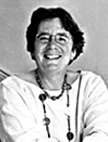Speaking of Audio: Poetry & Technology
By Robin F. Whitten
April is National Poetry Month, and two audio titles stand out for special mention.
- The Voice of the Poet: Langston Hughes (Random House Audio) A beautiful new anthology of Hughes's poetry includes his contextual narrative for each poem. Each poem is tracked, indexed, and accompanied by both the printed text and a brief commentary by series editor J.D. McClatchy. The three programs released this year -- Hughes, Adrienne Rich, and Wallace Stevens -- are on CD. More than a dozen poets are featured in Random House's series. Worth featuring as collector's items.
- The Best-Loved Poems of Jacqueline Kennedy Onassis (Hyperion Audiobooks) Caroline Kennedy introduces this collection of over a hundred poems, which show Jackie Kennedy's love of literature and her wide interest in poets, from Shakespeare to Frost. The CD format complements the seven sections of poems performed by numerous voices. Caroline Kennedy provides each section with a family context. Nostalgia aside, this is a fine collection and a 2002 Audie Award Finalist.
The advantages of the CD format are abundantly clear when looking for the best choices of recorded poetry programs. For years, I've fumbled my way through some wonderful audio collections of poetry trying to cue up a cassette to the beginning of a poem I wanted to hear again. What bliss to find how easy the CD tracks make it. "Listen to this," I say to my son, and we listen to Langston Hughes read "My soul has grown deep like the rivers…" CDs are perfect for poetry. Yet, availability of more and more CD versions of audiobooks has sparked some questions.
What is happening with audio formats? Are CDs and cassettes both viable? A long-term forecast isn't easy, but there's really no mystery about formats. Your customers tell you all you need to know. As booksellers, you already understand the paperback customer and the hardcover buyer. Draw a parallel to your audiobook customer and selecting formats becomes easier. One customer wants CDs because his car has a CD player. Another customer wants cassettes because she exercises with a Walkman. Listeners are not ambivalent about the format -- they all know where they like to listen, and they know what hardware they have to listen with.
The auto industry makes the decisions for listeners who enjoy their books in cars. More than 60 percent of all 2001 model cars have CD players. Now that the hardware is generally available and used where people listen to books, the audio publishers have put many more CDs into the market. Random House publishes 50 percent of its frontlist on CD. A year ago, only 33 percent was available on CD. Simon & Schuster Audio and Naxos Audiobooks produce every title in both CD and cassette formats. S&S Audio's publisher, Gilles Dana, emphasizes the market-driven approach: "We do not want to decide for the customer." With titles available in two formats, the customers will define future format releases.
It's undoubtedly a transitional period. Publishers are watching response and testing markets. Random House has reissued such evergreen titles as Sue Grafton's mysteries on CD and has experimented with CD-only titles. The digital download format dominated currently by Audible, Inc., is a growing option. Nevertheless, booksellers can rely on what their own customers tell them.
Audiobook choices are often alternatives to print books. Listening is a way for readers to enjoy more books. Listening patterns and preferences are based on lifestyle. If you're not displaying the audiobooks -- both CD and cassette -- alongside the companion hardcover or paperback, you're missing a chance to build your audiobook business and to understand your customers' format preferences.
Comments, questions, and requests are welcome at this audiobooks column. Send to Robin@audiofilemagazine.com. Robin Whitten is the editor and founder of AudioFile magazine, the source for comprehensive reviews, news, interviews and comment on audiobooks -- www.audiofilemagazine.com.